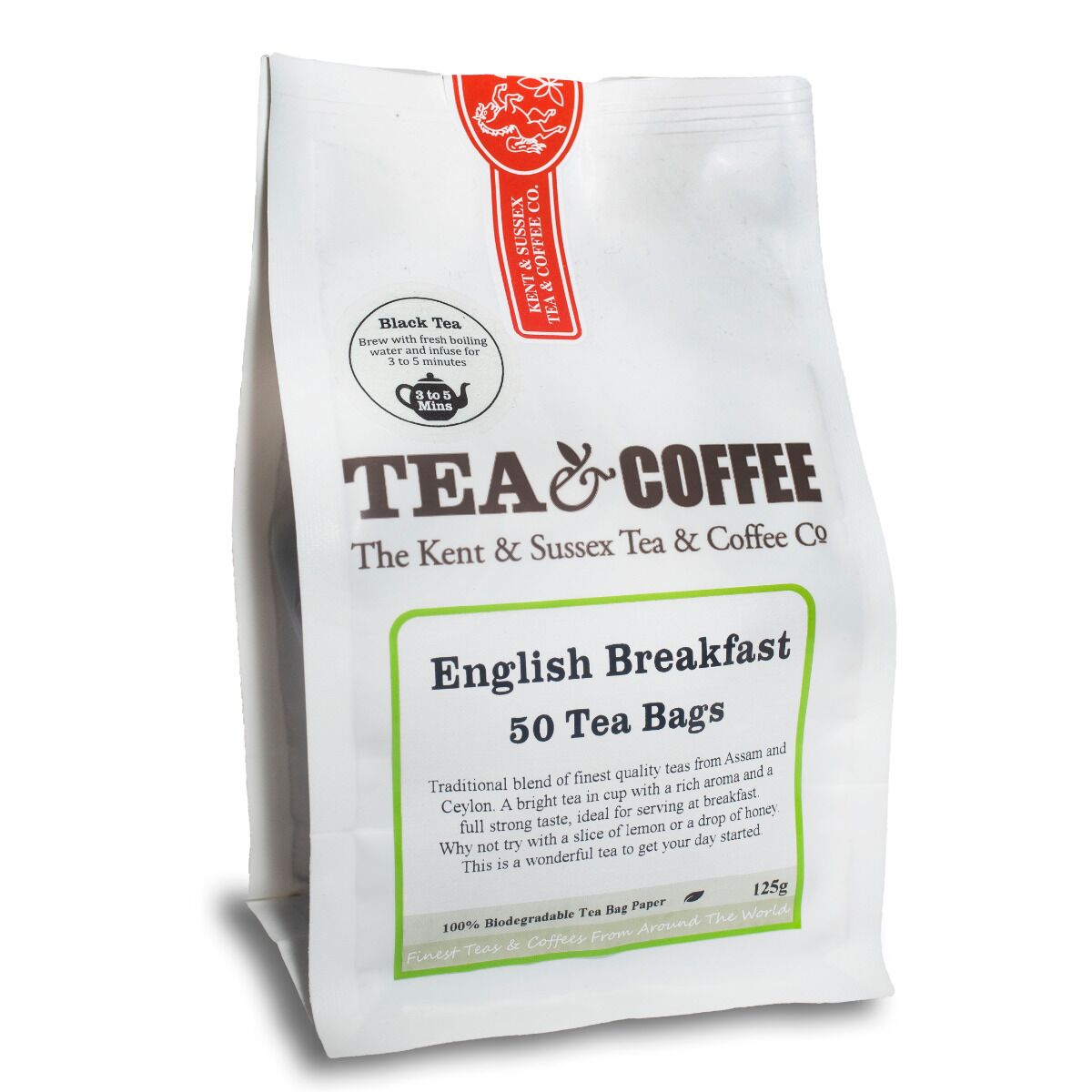English Breakfast Tea Bags Brewing Guide
Add Tea Bags
Add 1 Tea Bag per mug or 2 for an even stronger brew.
95⁰c - 100⁰c
Boil using fresh water, at a temperature of 95⁰ - 100⁰c.
3 - 5 Mins
Steep for 3-5 minutes, depending on personal preference
About Product
-
Product Description
English Breakfast tea bags are a classic favourite from the 1800s. They are made from a strong combination of various black teas. and have malty flavors that provide a rich and invigorating cup; thus making it full-bodied and refreshing to drink. This type of conventional infusion is ideal for rushed mornings or lazy afternoons when there isn’t enough spare time.
Whether it’s had with milk or sweetened with honey, they ensure you can easily make yourself a comforting drink whenever needed. Now, let us delve into the history and understand why it became such a popular choice among people worldwide.
Key Takeaways
- A fusion of high-quality leaves sourced from Assam and Sri Lanka.
- Guarantees a strong and rich brew that captures the epitome of excellence.
- Discover the origins and creators, and how Queen Victoria had influence.
- Get a comprehensive guide on brewing, and more suggestions and tips.
History of English Breakfast Blend
The history of this Breakfast Tea, a mix that is said to be the typical British experience, is wrapped in many stories. Its roots can be traced back in the 19th century, when Robert Drysdale. A Scottish tea merchant made a strong and hearty blend intended to kick-start one’s day.
This happened when people started to change their preferred morning drink from Ale to Tea. To make his concoction have an appealing market perception, he called it “Breakfast Tea”. Since he knew that this would excite people about beginning their day with something stimulating.
It was after Queen Victoria had it during her stay at Balmoral that popularity for this beverage increased. She fell in love with its brilliant taste and brought some back home. Thus solidifying its place within the English tea culture forever.
As time went by, so did the meaning change – referring only to certain types of black teas, which are strong enough. Even though you may add milk if desired – now it can also refer to any black type served with sugar or/and milk.
English Breakfast Tea is Made from Black Tea Leaves
To ensure a well-rounded and flavorful morning tea, the best estates in the area must be sought when selecting Assam and Ceylon leaves. It is common knowledge that Assam Tea from India and Ceylon Tea from Sri Lanka have excellent taste.
These dried leaves are made into black teas. The teas are blends of leaves grown under perfect conditions with enough rain. With their fullness of body, such gardens in Sri Lanka yield rounded breakfast teas. They are most suitable for an early morning energiser.
In Assam, the lowlands of Brahmaputra River Valley house many tea estates due to favourable climate and soil. These conditions are necessary for growing this plant. Hand picking followed by delicate processing brings about strong flavor associated with malty notes found in bold Assams.
Higher altitudes are in cooler regions. This is unlike the lower, warmer areas where it’s grown. At Highlands, the tea has a lighter character. Tasters have noted this at sessions at different elevations in Sri Lanka. So that natural tastes & smells are retained, the plucking and treatment methods used on these leaves need to be gentle.
While selecting your cuppa for tomorrow’s morning’, look for a balanced blend that will give you both strength and richness. It should have a deep amber hue with lingering smoothness on the palate.
Brewing Guide for English Breakfast Tea Bags
Brewing these is a simple process, but it needs to be done right. Here are some steps on how to make a perfect strong cup:
- Heat the Water – Begin boiling fresh, cold water. It’s recommended you use filtered water for better flavour.
- Warm the Teapot – Put some boiled water in your teapot and swirl it around so that the pot becomes warm, then pour out this water.
- Add the Bag(s) – For each cup of tea being made, put one breakfast tea bag into the pot; if desired, use an extra bag for a stronger cup.
- Pour Boiling Water – Fill up your teapot with freshly boiled water over, so they can infuse.
- Steep Tea – Let it steep for 3-5 minutes, depending on how strong you want your brew. The longer it steeps, the more intense and full-bodied flavor it gets.
- Remove Bags – Once enough time has passed after brewing (leaving them any longer will make it bitterer). Take them out used during the preparation stage.
- Serve – Pour into cups; can serve with milk or sugar or lemon depending on how one likes it. This well-made drink could serve as an amazing start to any day or consumed when someone takes a break from work and relaxes for a while.
Flavor Profile
This blend starts well rounded, but ends sharp and robust, with malty and slightly woody in a way that’s very satisfying. The brightness and refreshing quality of the Ceylon in it but also get some deep comfort from Assam tea gardens.
Caffeine Content
With around 40-70 milligrams per cup, this is a good option if you want an AM pick-me-up without going overboard. Unlike stronger coffees, which might leave people feeling too jittery up all day long.
Tips for Enhancing Your Tea Experience
Here are some tips to make your it even better:
- The quality of your water matters a lot. Always use fresh water never boiled before.
- The brewing time depends on how you like your tea. Five minutes for a strong cup, three minutes for a lighter one.
- To start your day right, pour into your favourite cup. Watch the golden colour and let it wake you up.
Brewing the perfect cup of tea is about enjoying taste, sight, and smell.
Why Choose Our English Breakfast Tea Bags?
We work hard to protect our planet. That’s why our English Breakfast Tea Bags meet top eco-friendly standards. We care about the environment like you. So, we made our tea bags biodegradable and plastic-free. Our packaging is recyclable, too. By picking our tea, you help make our planet healthier. You support a sustainable future with every cup.
Commitment to Sustainability and Eco Friendly Packaging
Every part of our product journey is green. From picking the leaves to when you enjoy your tea, we think of the planet. We follow sustainability at every step. We aim to reduce our impact on the earth. They don’t leave harmful stuff behind in the environment. We take our ethical duty seriously. We know our actions affect our world and everyone in it.
- Biodegradable, which break down safely in the environment.
- Plastic-free paper to eliminate unnecessary waste.
- Compostable materials that can be repurposed to nourish the earth.
- Sourcing that respects the environment and the communities involved.
Promotion of sustainability throughout our operation, reflecting our green principles
We’re proud to offer ours in a way that helps our planet. Our customers can enjoy it knowing they’re doing well for the environment. We want you to start your day with our tea and embrace an eco-friendly lifestyle.
Offering the convenience of enjoying this exceptional tea blend without the hassle of loose leaf tea. You can choose between packers of 50 or 100, ensuring you never run out of your favourite tea in the morning. Order today and enjoy the rich undertones of this well-rounded English breakfast blend delivered right to your door!
-
Delivery Information
We offer reliable delivery services through Royal Mail to ensure that your orders reach you on time.
Here are the main points you should be aware of:
- Standard UK Delivery: £3.95 excluding delivery charge.
- Delivery Times: Orders are processed and dispatched within 2-5 working days but they may take longer during busy times. It is worth noting that all our orders are packed by hand in order to maintain the quality.
- Free Delivery: We are delighted to provide free shipping for UK orders over £35*. Moreover, customers from Europe can enjoy free shipping for any purchase above €75*. Furthermore, we offer free delivery in the USA for all purchases exceeding $125*. Please note terms and conditions may apply.
- Tracking: When your package is sent you will receive a tracking number via email so as to keep tabs of its progress.
International Shipping
We do ship worldwide meaning our products can be accessed by anyone around the world.
Here are some important details:
- Delivery Times: International deliveries vary based on destination, generally taking between 7-14 working days.
- Shipping Costs: International shipping costs are calculated at checkout based on your location and weight of your order. View full delivery charges for your location.
- Customs and Import Duties: Remember customs or import duties may exist depending on regulations in your country; these charges are borne by the customer.
Returns Policy
Your satisfaction is our top priority, however if for any reasons you’re not completely happy with your purchase, simply follow our returns procedure:
- Eligibility: Items returned within 30 days of receipt must remain unopened and in their original condition.
- Process: In order to return an item contact our customer service department using your unique order number after which detailed instructions will be given concerning returning them back to us securely.
- Refunds: Our aim is to refund you within 5-7 working days upon successful reception of returned goods. The refund amount will be credited to your original payment method.
For any other Enquiries or help please contact our Customer Support Team always at your service.
-
Product Reviews


